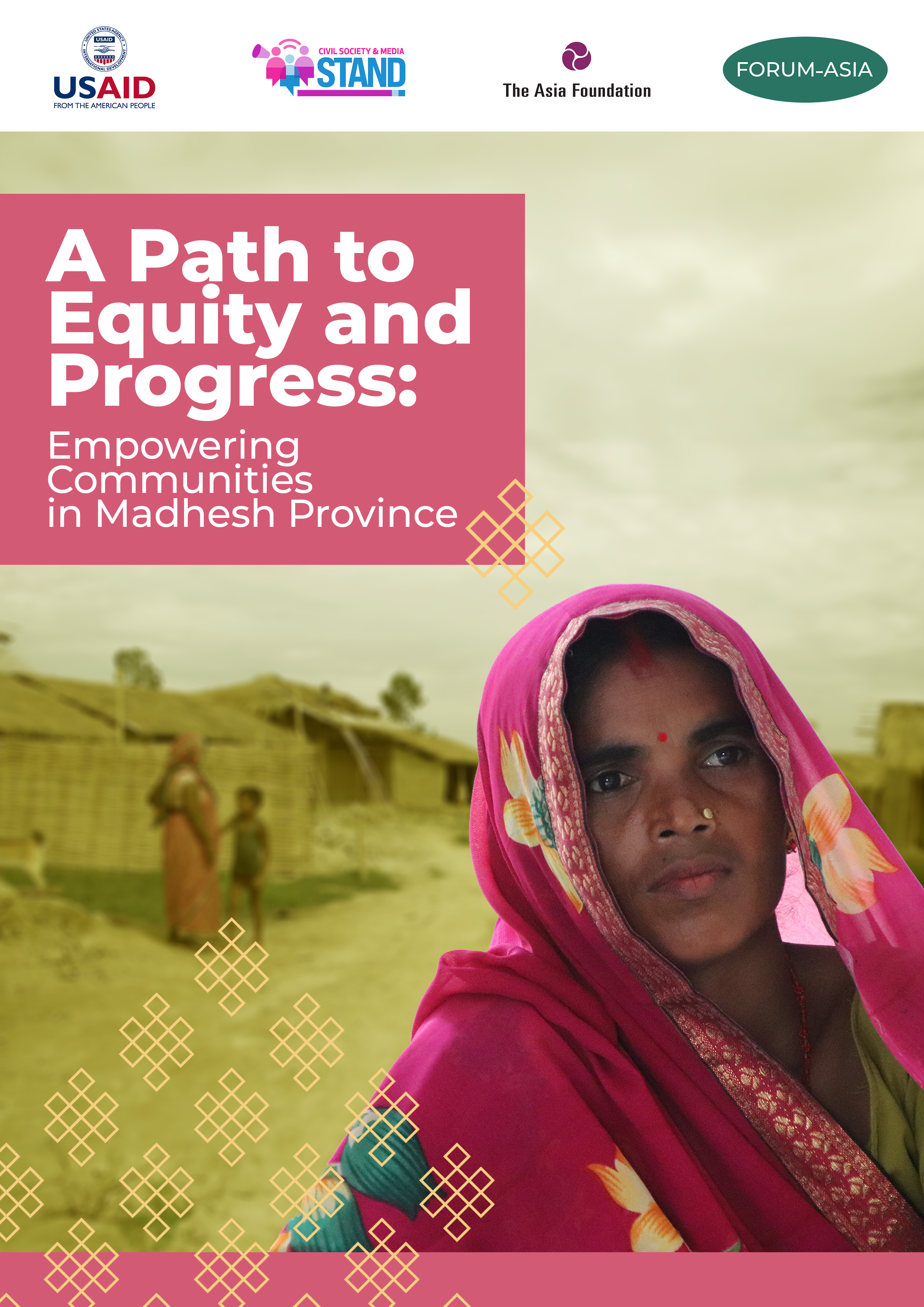 The fact-finding mission specifically aimed to unearth human rights violations and abuses related to fundamental freedoms of expression, association, and peaceful assembly faced by three distinct groups: women, youth and marginalized within the Madhesh province of Nepal. This mission seeks to shed light on the challenges and opportunities faced by these groups, ultimately aiming to pave the way for a more equitable and just society.
The fact-finding mission specifically aimed to unearth human rights violations and abuses related to fundamental freedoms of expression, association, and peaceful assembly faced by three distinct groups: women, youth and marginalized within the Madhesh province of Nepal. This mission seeks to shed light on the challenges and opportunities faced by these groups, ultimately aiming to pave the way for a more equitable and just society.
The research was conducted in Saptari, Dhanusha, Sarlahi, and Rautahat districts of Madhesh Province. These districts have a very low human development index among WYM, and the human rights situation for these groups is notably worse compared to other districts in the Madhesh province. The study employs various methods for data collection, encompassing FGDs, KIIs, and case studies. This combination of methods allows for a comprehensive exploration of the research questions and ensures a well-rounded analysis of the topic. In the research locations, a total of 24 FGDs were carried out with 329 respondents across four districts, involving WYM groups.
Among the pivotal findings concerning women in the region—a complex web of gender-based violence, discrimination, and restricted access to education and healthcare was exposed. Gender disparities persist both within the confines of households and on a broader societal scale. This is particularly pronounced among women in marginalized communities, who continue to grapple with unequal treatment and numerous barriers that obstruct their educational, employment, and personal development pursuits. The perpetual cycle of inequality limits their potential contribution to society and vice-versa. The culture of favoring sons perpetuates gender inequality and hinders women’s access to education, which is a vital pathway to empowerment and progress. Obtaining citizenship poses a formidable challenge for women. The prevailing legal framework anchors a woman’s identity to that of her father or husband, effectively depriving her of independent recognition. This systemic gender-based approach further diminishes women’s autonomy and restricts their access to civic participation and basic rights. Compounding these issues is the persistence of child marriage, particularly prevalent within marginalized communities. Early marriages, often rooted in cultural practices, impede girls’ educational prospects and expose them to heightened health risks. The consequences of child marriage reverberate through generations, perpetuating cycles of disadvantage and inequality.
The youths of Madhesh face a complex set of challenges, with a primary concern being the lack of availability of job opportunities. This shortage of employment options leads to both a brain drain and issues related to drug abuse. This challenging environment hampers their potential to make positive contributions to society, as their aspirations are stifled by economic limitations and a lack of avenues for meaningful civic engagement. The lack of available employment prospects has driven many young individuals to prematurely abandon their education. Faced with a perceived absence of opportunities, they view education as a pathway to nowhere, opting instead to engage in unskilled labour or even migrate in search of work.
The marginalized Dalit communities, notably the Musahar, Dom, and Mestar (Halkhor)[1] subgroups, are ensnared within a complex web of injustices that systematically curtail their fundamental rights. These injustices span across crucial aspects of life, including citizenship, land ownership, birth registration, education, and access to healthcare. In this study we mainly interacted with the Haruwa Charuwa community, who are predominantly landless and are particularly susceptible to floods and other natural disasters. Within these communities, the lack of access to citizenship and birth registration erects formidable barriers that undermine their ability to access vital services, representation, and legal recognition. The absence of land ownership further deepens their plight, dispossessing them of a means to secure their livelihoods and contribute to the economy.
The fact-finding mission underscores the urgency of transformative actions to confront and redress gender-based disparities. By challenging discriminatory norms, effectively implementing legal reforms, and fostering inclusive education, a more equitable society can be built, where women’s rights and potentials are fully recognized and realized. By addressing the root causes of unemployment, providing opportunities for skills development, fostering transparent governance, and offering platforms for meaningful civic engagement, it is possible to channel the energy and aspirations of the youth towards constructive endeavors. Dismantling the barriers faced by marginalised Dalit communities demands a collective effort involving governmental institutions, civil society organisations, and international collaborators. By addressing the underlying systemic inequalities and providing avenues for empowerment, we can foster an environment in which these communities can escape the cycle of vulnerability and achieve their rightful place within society
This document serves as an executive summary of the comprehensive report titled “A Path to Equity and Progress: Empowering Communities in Madhesh Province”. For the complete and detailed insights, please refer to the original report. This summary aims to provide a quick reference and snapshot of the key findings and recommendations.
Read the report here.
Download the Nepali version of the report here.



